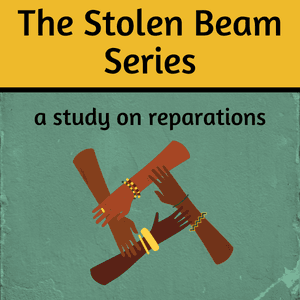Jones Library Will Host Stolen Beam Series On Reparations

Photo: Jones Library
Source: Jones Library, Amherst African Heritage Reparations Assembly
Introduction To The Stolen Beam Study Series
In response to the murder of George Floyd in May, 2020, the Jewish Community of Amherst (JCA) established a committee on Racial Justice. A subcommittee began studying reparations to the African American community. After six months of studying written materials, the committee had intensive internal study sessions, reflecting on what they had read. From these discussions, they developed the Stolen Beam Study Series, a five-session program with readings and thought-provoking questions illustrating a different perspective on U.S. history from that which is usually taught.
When the JCA offered the program to its members, 65 people signed up the first day. This enthusiasm led the developers to consider expanding its reach beyond the JCA community. Stolen Beam study sessions have been offered to Reparations4Amherst (R4A), Congregations Beit Ahava and Bnei Israel in Northampton, the Pelham Library, and the Unitarian Universalist Society of Longmeadow, among others. It is now being piloted in several Jewish congregations around the country, and has been nominated for a national award in Reconstructionist. The Jones library originally planned to offer the five part series in May of 2022 and then postponed the offerings until Fall of 2022. The series will now be offered in five online sessions beginning, Thursday, September 22 from 7:00-8:20 p.m. Registration is required. Registration opens on Tuesday, August 16 and closes at noon on Tuesday, September 13. The Zoom meeting link will be sent to registrants after registration closes.
Register here.
The goal of the series is educational engagement with a narrative of US racial history that is different from what many of us learned in our schooling. The class will focus on the legacy of African enslavement, what was stolen, what may be owed, and historical examples of reparations. The class offers an opportunity, especially for those relatively new to the topic, to study and reflect on writings of prominent thought leaders on the topic of reparations for African Americans as a path to restorative justice. Each class offers readings as well as videos or audio recordings. Suggested study questions are included for each class. This is not a lecture format. We urge all participants to plan on reading and/or viewing all the materials for each session and come prepared for thoughtful discussion.
The class will meet via Zoom. Registration indicates the intent to attend and participate in all five sessions. There is no charge for this program. Most reading/video materials will be provided via the internet. Some of the materials may be available at the library.
Please note: This course requires reading, viewing, active participation, and a commitment to attend each session, except for extenuating circumstances. Thank you!
This series is co-sponsored by the Jones Library and the African Heritage Reparation Assembly..
The name “Stolen Beam” is a reference to a Talmudic debate about the right thing to do when we discover that the house in which we live was built with stolen materials, “a stolen beam.” One rabbi argues that the entire house must be torn down and the beam returned. Another argues that it makes no sense to destroy the home, yet some form of acknowledgment and compensation is owed to the owners of the beam. We therefore use the metaphor, The Stolen Beam, in recognition of the fact that much of our country was built on stolen land, with stolen lives and stolen labor.

3 thoughts on “Jones Library Will Host Stolen Beam Series On Reparations”